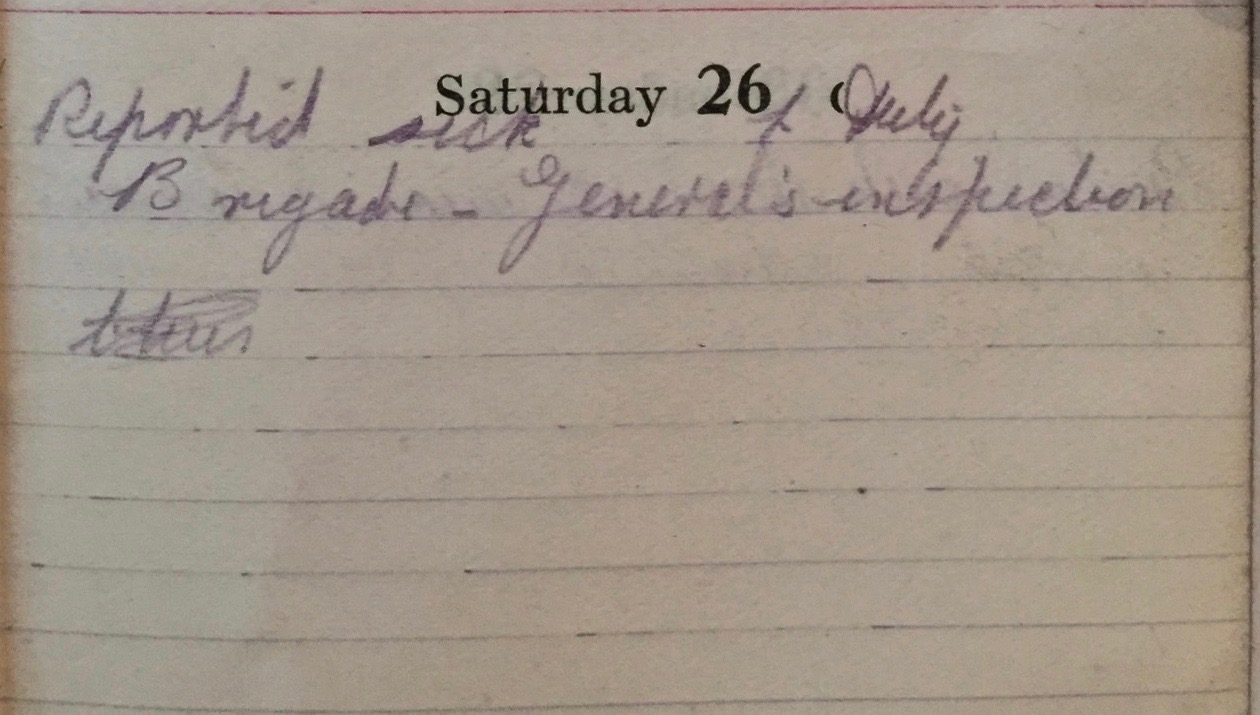Saturday October 26th, 1918
Reported sick – light duty. Brigade-General’s inspection.
Brigadier-General Williams has inspected the 9th Battalion of his 199th Brigade. Neither Frank nor the War Diary provide further insight to his visit. The Brigadier-General sounds quite inspirational though – click on his name to read more about him.
Germany’s War
Since the Fourth Army broke through the Hindenburg Line at the end of September, Germany has been contemplating peace. Instead of approaching the long-standing Allied nations, it has approached President Wilson, believing he will be more accommodating of their demands.
Sinking Royal Mail Steamer (RMS) Leinster

The process isn’t going smoothly. Just six days after they make their first approach to Wilson, a German U-boat sank RMS Leinster on October 10th, 1918. The Leinster was one of the four mailboats which ran routinely between Kingstown (now Dun-Laoghaire) and Holyhead.
It was carrying many civilian passengers plus soldiers, sailors, airmen and nurses from Ireland, Britain, Australia, Canada, New Zealand and the US. 565 lost their lives, including 21 of the 22 onboard postal sorters.
The photograph shows Henrietta Mellet of the Canadian Army Medical Corps. She was drowned when the Leinster was torpedoed. A native of Galway, she had settled in Ontario, Canada in 1908. She is buried in the Mount Jerome Cemetery, Dublin, Irish Republic.º
On October 14th, 1918, President Wilson, with a detailed response, dashed Germany’s ideas of a lenient peace. ‘The President feels that it is also his duty to add that neither the Government of the United States nor (he is quite sure) the Governments with which the Government of the United States is associated as a belligerent will consent to consider an armistice as long as the armed forces of Germany continue the illegal and inhuman practices which they still persist in.’¹
Facing mounting pressure, a week later, Germany withdrew its U-boats from combat.
Ludendorff Sways
On October 1st, 1918 Ludendorff, chairing an operational review of the war, had ‘opened the meeting with a statement that stunned those present into silence: “The OHL [Oberste Heeresleitung – Army High Command] and the German Army are finished”; the war could not be won; rather, the final defeat was probably inescapably at hand.‘ ² He advised the Kaiser to request an armistice.
However, after the initial shock of the collapse of the Hindenburg Line, the Fourth Army’s advance slowed and it looked like the Allied attacks to both the north and the south were stalling. This made Ludendorff think that Germany could push the war into 1919 and secure more favourable terms as a result.
However the slowdown was short lived and the Allied forces quickly made progress on all fronts.
On October 23rd, President Wilson sent a further note. ‘Wilson made it quite clear that if the United States had to deal with the ‘military masers and monarchical autocrats of Germany’, then, ‘it must demand not peace but surrender.’³
This triggered the issue of an unsanctioned Army Order from Hindenburg and Ludendorff. It stated that Wilson had demanded unconditional surrender and the Army must fight to the end. For this gross act of insubordination and his unhelpful, oscillating views on the military situation, the Kaiser reprimanded Ludendorff who then resigned. His command was passed to General Wilhelm Groener – who today is still only half-way in his journey from the Eastern Front to pick up this poisoned chalice.
9th Battalion War Diary – 26th October 1918 – Elincourt
Inspection by GOC Brigade.
References & Further Reading
¹ Extract of note from Robert Lansing, US Secretary of State, to Germany’s representatives, October 14th, 1918. The Guardian, October 16th, 1918, page 5
² ‘History of WWI: The Western Front 1917-18: From Vimy Ridge to Amiens and the Armistice’ by Andrew Wiest. Amber Books, 2014, Kindle Locn 3149
³ ibid, Kindle Locn 3347
* WWC H22-26, copyright Imperial War Museums
º Nursing Sister Henrietta Mellett on Canadian Great War Project



One thought on “Germany’s War – October 26th, 1918”
Comments are closed.